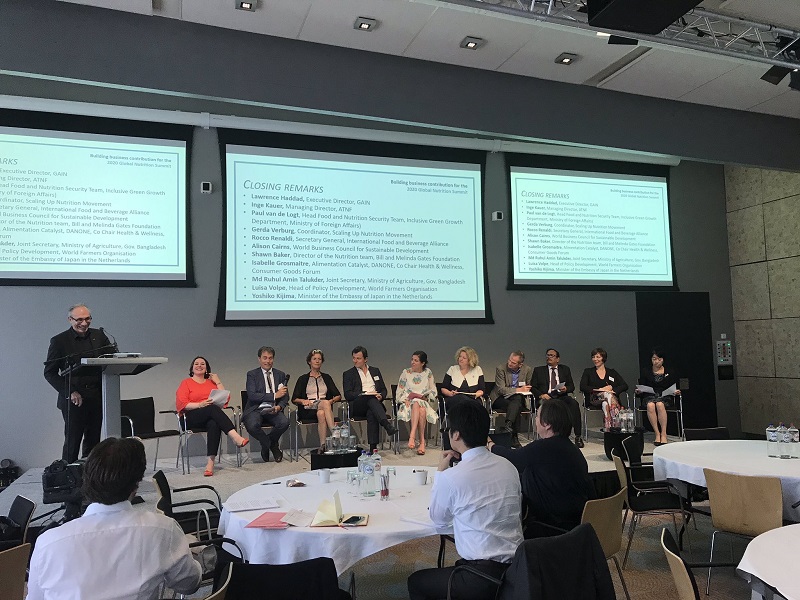On June 26th, the WFO Head of Policy Development, Luisa Volpe, joined the two-days event “Building Business Contribution for the 2020 Global Nutrition Summit”, in The Hague, Netherlands.
Hosted by the Government of the Netherlands and co-organised by GAIN and the Access to Nutrition Foundation (ATNF), with the support of the Government of Japan, SUN Movement, the Netherlands Working Group on international Nutrition and the World Business Council for Sustainable Development (WBCSD), this event represented a key first step for consulting with and including the perspective of business into the Japan 2020 Summit.
2020 will be a pivotal year for global nutrition. Japan is hosting a Global Nutrition Summit (Japan 2020) which represents an unprecedented opportunity to set the world on a pathway towards achieving the SDG targets – in particular, to end malnutrition in all its forms by 2030 and strengthen the link between diet, food systems and health.
Japan 2020 aims to acknowledge nutrition as an essential driver of sustainable development and to secure new and refreshed policy and financial commitments from governments, civil society, private sector, donor agencies and the UN to act on malnutrition in all its forms. It is being organised by the Government of Japan with support from the UK Department for International Development and the Bill and Melinda Gates Foundation.
Speaking from the perspective of a farmers’ organisation, Luisa Volpe reminded the audience that SDGs are intended to be global not only for the geographical distribution of the countries that are called to implement them, but also because all sectors of the society are involved in their achievement.
Farmers are called to play a key role for transforming the food systems, as also recognized by the EAT Lancet Report, therefore it is very important for them to engage in discussions with the food and beverage industry.
During her speech, Luisa Volpe reiterated that farmers are not interested in increasing the size of their farms tout court: farmers are interested in increasing the sustainability level of their farms.
“Sustainability includes environmental sustainability, as farmers are those who are most exposed to the climate change impact.
Sustainability also in terms of social component, as what farmers really want is to improve the wellbeing of their families and livelihood.
And of course, farmers are interested in the economic viability of their farms. And with proper access to innovation they are able to increase the quality of the food they produce. Farmers are entrepreneurs and the work they do, the food they produce respond to the market pulling forces.
Food and nutrition value, this is exactly what farmers produce.
Farmers are ready to do their part in the food system transformation towards global sustainability and they are also ready to partner with the food industry sector to implement win-win actions towards that goal. Farmers do not expect to receive training from the industry sector, they want rather work with the industry sector to raise the sustainability all along the value chain.
As WFO we are already partnering with the International Fertiliser Association, the International Seed Federation and the agrochemicals for programmes on climate change and we are ready to partner with you all actors in the food value chain towards a sustainable food system transformation.
We look forward to working with you towards the Global Nutrition Summit in Japan in 2020”.
